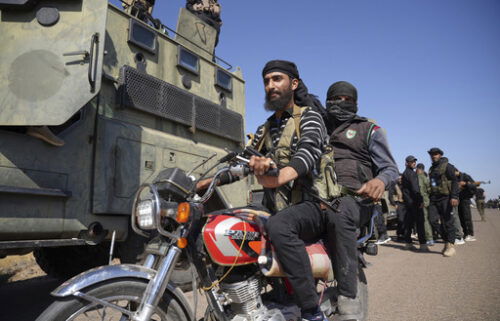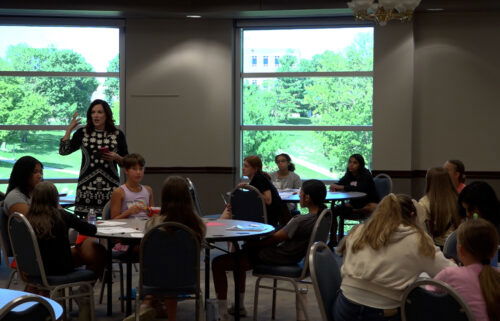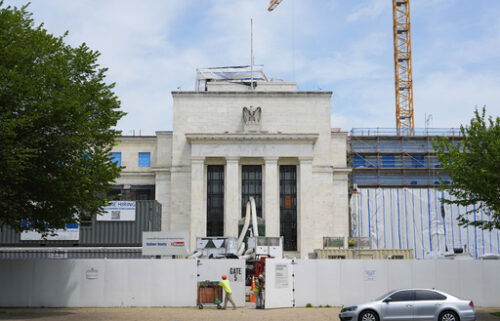Local Catholics ponder the legacy of Pope Francis and the future of the Church

ST. JOSEPH, Mo. (News-Press NOW) -- The death of Pope Francis, who had served for twelve years as Supreme Pontiff of the Roman Catholic Church, means Catholics are looking back upon his legacy and looking ahead to the Church's future.
Just hours after making a surprise appearance on Easter Sunday at the Vatican in Rome, Pope Francis, who had been struggling with illness for several months, died early on Easter Monday morning.
Since then, over 1.5 billion Catholics worldwide, including Catholics in the St. Joseph area, continue to reflect on the unique legacy of Francis, while also asking questions about the future.
Jacob and Paulina, both students at Benedictine College, said the late Pope left a big impression on them.
"Pope Francis liked to focus upon those who didn't feel accounted for," Jacob said. "That included those who were left out and on the fringe of society."
Paulina, who met Pope Francis at an event in 2024, said, "Meeting him was a great experience. He was very humble and cared a lot about the community -- especially the Church."
Benedictine professor Dr. Matt Muller, said that Francis had a unique leadership style that was very different from his predecessors.
"I think his unique style inspired many people, but sometimes his statements caused some confusion," Muller said. "I don't think that was an accident, though. I think part of his vision was to stir things up."
Part of this stirring up, according to Muller, was to remind Catholics of the need for the Church to connect more strongly with the poor, marginalized and overlooked.
Francis, who grew up in Argentina, was the first Jesuit pope, a group within the Catholic Church known for its concern for the poor, among other things. He was the first pope from the Americas and the first pope from the Southern Hemisphere.
Muller said his papacy was marked by a return to simplicity, both in how he appeared and how he connected with a wide variety of people.
"His impact," Muller said, "has been a reminder for those of us in the church to have a merciful look at the world around us."
Father Stephen Hansen, of the Cathedral of St. Joseph, agreed with Muller's assessment.
"When he was an archbishop and cardinal in Buenos Aires, he would take public transit whenever he traveled," Hansen said. "This was unusual for someone of his prominence, but he did these kinds of things on purpose to set an example for church members and leaders."
Hansen also said that Francis was a "pope for the poor and those on the periphery."
When asked to pick one word to describe the papacy of Francis, Hansen replied, for him, it was simple.
"While all of us are called to show mercy," Hansen said, "Pope Francis can really be called 'a pope of mercy'."
The inclusion and mercy shown by Francis, included extending conversations to those in the LGBTQ+ communities and to those outside of the Christian faith, while simultaneously offering critique to consumerism, overdevelopment and populism.
Francis was particularly vocal about the plight of immigrants worldwide.
All of these things, according to both Muller and Hansen, both expanded the conversation of the Church into new areas, while at times causing controversy among those who were longtime Catholics.
This has led to more intense conversations and debates that usual about who the next pope will be.
"Pope John Paul II was a philosopher and world traveler, Pope Benedict XVI was a conservative and traditional theologian," Muller said. "Pope Francis emphasized the pastoral role of the pope above all else."
This, he said, leaves the Church with a wide range of approaches for the Cardinals to choose from when they meet in conclave in the weeks ahead.
Father Hansen, who was a seminarian during the time of Pope John Paul II and was also ordained during the papacy of Benedict XVI, said the Church has benefitted from the approaches of all three recent popes, thus giving him no reason to worry for who will take over.
"I love what Pope Francis said: 'Our God is a God of surprises'," Hansen said. "When you know that the Holy Spirit is involved in picking the pope, then you know the Holy Spirit will give them the clarity they need."
For Catholics, who represent about one out of every six people on earth, the spiritual direction and the global connection of the Catholic Church will be involved in prayers for the next leader of the Church.
A 2/3 super majority will be required of the votes submitted by Cardinals tasked with selecting the pope in the coming days.
The Cardinals will also keep the impact of a new pope in mind as they make their decisions.




